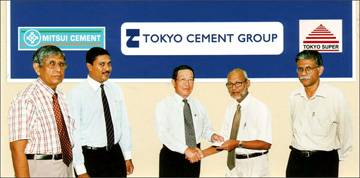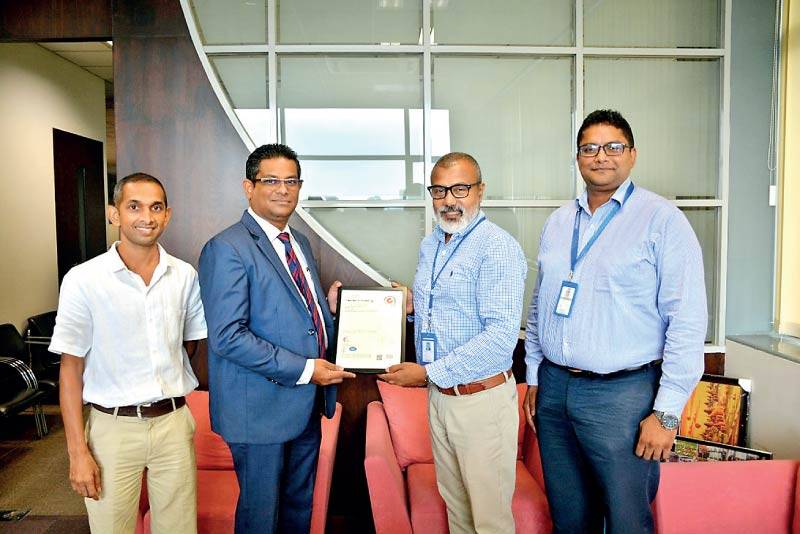
Aitken Spence Travels first to be certified for Occupational Health and Safety
Aitken Spence Travels proved their commitment to upholding exemplary benchmarks in occupational health and safety by becoming the first destination management company in Sri Lanka to receive the ISO 45001: 2018 Occupational Health and Safety (OHS) management certification.
Certified by the SGS United Kingdom Ltd., the scope covered in the assessment includes destination management services, inbound tourism, and activities including support services carried out at Aitken Spence Travels.
This is just one of the ways Aitken Spence Travels adds greater value to its stakeholders and sets benchmarks in the industry. An OHS management system focuses on establishing ongoing, systemic measures to identify and control OHS hazards and risks (including system deficiencies) in the working environment to safeguard the wellbeing of all stakeholders.
“This is yet another important step towards affirming to our employees, customers, partners, and other key stakeholders the value we place on occupational health and safety and our continuous efforts to improve and offer the best services in the industry. I thank the management team for their continuous support and dedication towards achieving this certification which is commendable” commented Aitken Spence Travels Managing Director Nalin Jayasundera.
This is one of the many certifications obtained by Aitken Spence Travels. The company maintains the Travelife Partnership Certification for its operations keeping in line with global sustainable tourism practices and has a longstanding partnership with TUI. Aitken Spence Travels was also the first destination management company to obtain ISO 9001:2008. Furthermore, the company’s operations are ISO 14001:2015 certified for their efforts toward environmental impact control.
Aitken Spence Travels, part of the diversified blue-chip conglomerate Aitken Spence PLC, is a joint venture with TUI Travel PLC, the world’s largest integrated tourism company. The Group’s destination management arm handles inbound and outbound tour packages for groups, FIT (Free Independent Travellers), and the MICE segments (Meetings, Incentives, Conferences, and Exhibitions) which operate in a highly competitive and tumultuous business environment.
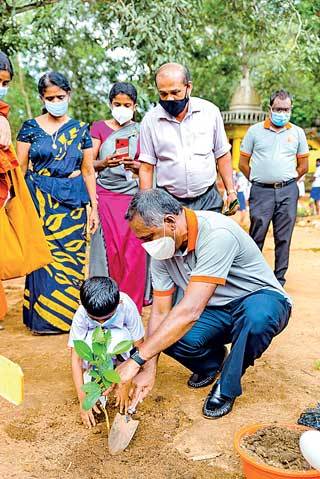
Sampath Bank continues to ramp up efforts to protect the environment
As the world continues to grapple with a multitude of environmental issues caused by irresponsible consumption and ecological degradation, businesses have stepped in to play a greater role in protecting the environment.
Enterprises are working closely with governments, business partners, customers, and all other stakeholders on developing business models that are good for the environment, the society, and their bottom line. Sampath Bank is one such responsible enterprise that has continued to champion the cause of the environment.
Right from its inception, sustainability has been one of the key priorities for the bank which has always adopted an environmentally friendly business model by leveraging emerging technologies.
Sampath Bank’s continued investments in the digitalisation of its core operations are one of the key drivers of its sustainability efforts. Over the years, the bank has introduced several pathbreaking digital solutions such as Sampath Vishwa, Payeasy, WePay and Slip-less Banking, to the market.
Transforming the way businesses and consumers access financial services, they have helped more Sri Lankans gain access to these services. At the same time, they have also played a significant role in helping protect the environment by enabling the bank, its customers and business partners to cut down on their environmental footprint.
The bank’s commitment to the environment extends to its business dealings too. Serving as an active partner of the country’s Non-Conventional Renewable Energy (NCRE) sector, Sampath Bank has offered financing for several renewable energy projects around the island.
Taking a hard look at every element of its operations, Sampath Bank strives to continuously identify more ways in which it can minimise its impact on the environment. The bank has been scaling up the deployment of energy efficient lighting and air conditioning solutions to drive energy efficiency and reduce its energy consumption levels.
Simultaneously, Sampath Bank has also been diligently looking at using alternative sources of energy for powering its operations. The bank embarked on a solar migration project in 2016 and has rolled out rooftop solar systems across several of its branches.
The bank is well aware of the fact that the things that get measured, get done. Hence it tracks its environmental performance and benchmarks its progress against peers. Sampath Bank monitors its Carbon Footprint closely and measures its direct and indirect emissions using the Greenhouse Gas (GHG) protocol.
Captured in the Bank’s annual Greenhouse Gas (GHG) emissions inventory report, this data helps it strengthen its carbon management strategy and pursue new opportunities for carbon reduction.
“Sri Lankan society has always placed great emphasis on living in harmony with nature. Conserving natural resources and protecting the environment has been an integral part of our culture. Being a responsible enterprise that takes great pride in its Sri Lankan roots, Sampath Bank remains committed to championing environmental sustainability through our eco-conscious business model as well as our continued investments in energy conservation and environment-centred CSR initiatives.
“In light of the rising concerns around global warming and other environmental issues, we are expanding the scope and scale of our sustainability and community outreach efforts to have a greater positive impact on both society and the environment. We will continue to engage with all stakeholders to present a better future for all Sri Lankans,” said Sampath Bank PLC Managing Director Nanda Fernando.
Going beyond its business activities, Sampath Bank has been investing heavily on the environment through its strategic corporate social responsibility initiatives as well.
Sampath Bank has always taken great pride in Sri Lanka’s heritage and is hence well aware of the significance of the country’s network of inland tanks or ‘wewas’, built eons ago by the past kings. Serving as the principal source of water for irrigation and domestic use in the country’s dry and intermediate zones, the tanks also support rich ecosystems made up of countless plants, animals and insects around them.
The bank has been restoring dilapidated tanks through its flagship CSR program, ‘Wewata Jeewayak’. To date, 10 tanks have been renovated under the project, and work on three more tanks are currently underway. Ensuring a continued, reliable supply of water for families engaged in farming and other related activities, the restoration of these tanks also nourishes the ecosystem intrinsically linked to it, thereby helping conserve and nurture the region’s biodiversity.
The bank is also involved in a five-year project together with Biodiversity Sri Lanka to restore 10 hectares of degraded forest land in the Halgahawala Forest Reserve in Opatha, Galle. The International Union for Conservation of Nature (IUCN) and the Forest Department of Sri Lanka are offering technical assistance to the program which is aimed at increasing the number of plants in the area from 9,000 to 30,000. A plant nursery consisting of 4,500 plants has been set up to nurture a variety of species.
In addition to these programs, Sampath Bank has been supporting the Wildlife and Nature Protection Society (WNPS) of Sri Lanka’s conservation efforts for over 27 years. The bank has been contributing a sum of Rs. 5 to the society for every new Sampath Debit Card issued.
The bank also engages with school children through its Gasai Mamai Pubudu Potai initiative, aimed at encouraging young Sri Lankans to be more environmentally conscious. Under this unique program, Sampath Bank offers fruit saplings to children in primary schools. These saplings are planted within the school premises and the children are entrusted with the task of caring for them till they grow into fruit bearing trees.
Thus, with everything from its core operations to community outreach efforts being focused on protecting the environment, it is evident that Sampath Bank truly does have the environment at the heart of its business.
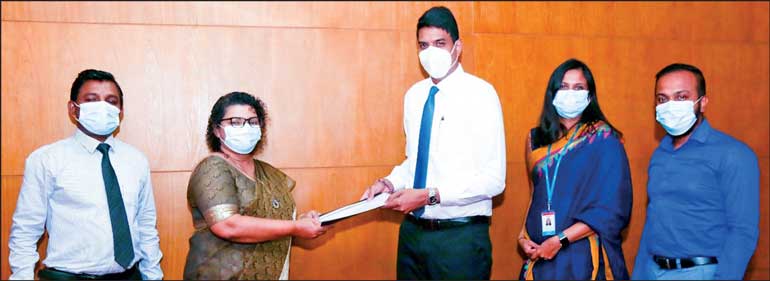
Hemas partners MEPA to address marine plastic pollution
Evergreen Shipping Agency Lanka Ltd., a joint venture between Hemas Transportation Ltd. and Evergreen Marine (Hong Kong) Ltd., has partnered with the Marine Environment Protection Authority (MEPA) to address marine pollution in Sri Lanka.
Evergreen Lanka has committed to the installation of an ‘Ocean Strainer’ floating trash trap at the Samanala Canal, Galle, and five ‘Beach Caretaker Projects’ across the country including Paranambala Beach and Luna Pokuna Beach. The partnership aligns with Hemas’ Environmental Agenda which strives to protect Sri Lankan Endemism through a three-prong action plan which includes responsible usage and disposal of plastic waste, safeguarding our ecosystem and protecting our natural resources.
Hemas Holdings Group CEO Kasturi Chellaraja Wilson said: “We are honoured to partner with MEPA in their efforts to ensure that we safeguard our marine ecosystem from plastic waste. As a part of the Group Environmental Agenda, we are committed to ensuring the reduction of the use of plastic that is harmful to the environment and the responsible disposal of plastic waste. This partnership is the first step in our efforts to reduce plastic pollution in our country by facilitating initiatives across the island to continuously collect community plastic waste disposed to the environment, while also working towards offsetting our plastic footprint.”
The beach caretaker program aims to keep the coastline clean through community-led conservation while empowering their livelihood, by providing caretakers with a reliable source of income. The initiative hopes to keep approximately five tons of plastic waste out of the ocean, assisting the conservation of Sri Lanka’s threatened and degraded
marine ecosystem.
“Sri Lanka is a nation that is rich in biodiversity and marine ecosystems, but unfortunately, this is under threat due to plastic pollution. As a responsible corporate that focuses on making healthful living happen across all communities we serve, we felt it is important that we play a role in ensuring the protection of our marine ecosystem. Clean and healthy oceans play a vital role in balancing ecosystems and water resources and mitigating the impacts of climate change. Through these initiatives we hope to reduce the plastic waste that enters the ocean and protect the marine ecosystem of Sri Lanka,” said Hemas Holdings Director – Mobility Sector Mushin Kitchilan.
With approximately 900 MT of plastic waste generated daily in Sri Lanka, the ‘Ocean Strainer’ floating trash trap will trap, collect, and remove plastic waste before it reaches the ocean. The Ocean Strainer floating trash trap initiative was conceptualised and developed by MAS Holdings, with the installation of the first Ocean Strainer in the Dehiwala Canal in August 2020. In its first year since installation, this floating trash trap has managed to keep approximately 67,000 kilograms of plastic waste away from the ocean. Believing in the power of open innovation and collaboration in problem-solving, MAS announced in early 2021 that they would make the Ocean Strainer technology openly available to interested parties, in order to replicate and scale up the solution.

KVPL Bags Top Accolade At Ceylon Specialty Estate Tea Of The Year Competition

KVPL team comprised of Rajitha Gnanasekaran, Kasun Dhanapala, Anura Senanayake- DGM- Pedro Estate, Sarath Siriwardena- Director/ CEO of KVPL, Daya Priyantha, Uditha Tennakoon- Group Manager- Glassaugh Estate, Nuran Amarathunga, Laxman Keregala
Hayleys group company, Kelani Valley Plantations PLC (KVPL), took top awards at the recently concluded ‘Ceylon Specialty Estate Tea of the Year Competition’ taking place in Bejing, China.
Taking place at the culmination of the ‘Ceylon Tea Week’ organized by the Sri Lanka Tea Board and the Colombo Tea Traders’ Association in partnership with the Sri Lankan Ministry of Agriculture, the Ministry of Commerce, the Ministry of Cooperatives and the Embassy of Sri Lanka in China. Ceremonies were also held to recognize the best Sri Lankan tea factories which produced winning teas, in addition to a well-attended Charity Tea Auction at the end of the week.
The preliminary round of the competition was held in Sri Lanka following which, 98 samples of the best teas produced within the seven primary agro-climatic regions of Sri Lanka, as well as Ceylon Green Teas, CTC Teas and Innovative Teas/ Handmade Teas were taken to China for the final competition.
The second charity tea auction was held during the subsequent day at the Beijing Exhibition Center (Russian Centre). While all the gold winners were auctioned, only a few selected Silver and Bronze winners were identified for sale in view of the limited Sunday participants, with a total of RMB, 41,600 being realized at the end of the second auction.
“Shenzhen Shenbao” a major buyer of Ceylon Teas who continues to patronize imports of teas from Sri Lanka turned-out to be the highest bidder at the first Charity Tea Action by securing the Nuwara Eliya Region Gold Award for Lovers Leap Garden Mark FBOP, at a price of RMB 10,000 for the 05 kilos package (approx. SL Rs. 44,000/kilo). “Shenzhen Shenbao” was also recognized for achieving the second highest bid at the same auction at RMB 9,000 for the Nuwara Eliya Region Silver Award which was from Mahagastotte Garden Mark, OP, Grade (Approx. SL Rs. 39,600/kilo) for the 05 kilo package. The Pedro Estate under Kelani Valley Plantations owns both these garden marks.
The Grand Finale was concluded at the National Agriculture Exhibition Centre in Beijing amid the 9th International Chinese Tea Exhibition. The First Charity Tea Auction took place at the Event Hall of the exhibition location during the day following a final round judging.
Hayleys Kelani Valley Plantations (KVPL) has consistently been ranked number one among Sri Lanka’s regional plantation companies in rubber. The company manages 26 Tea and Rubber estates, with KVPL holding the record for the country’s highest ever yield of 1008 kg per hectare. In addition, KVPL comprises 26 estates covering approximately 13,000 hectares in equal extents of tea and rubber, spanning three distinctive agro-climatic regions, employing over 11,000 workers.
http://www.thesundayleader.lk/2017/05/14/kvpl-bags-top-accolade-at-ceylon-specialty-estate-tea-of-the-year-competition/
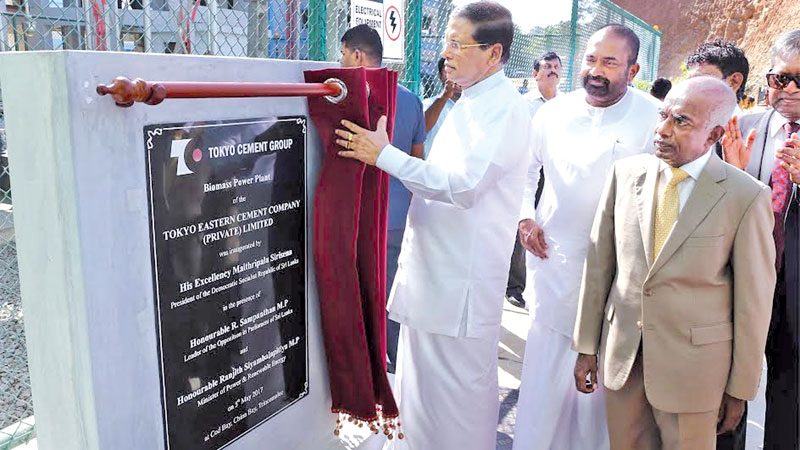
Tokyo Cement opens 2nd biomass power plant in Trinco

President Maithripala Sirisena inaugurates the Biomass Power Plant.
President Maithripala Sirisena last week ceremoniously inaugurated Tokyo Cement’s second Biomass Power Plant in Trincomalee as part of a series of events held in commemoration of the late founder Chairman A.Y.S. Gnanam.
The events included the foundation laying ceremony for a housing project for 25 families displaced during the war, distribution of deeds to residents of the Tokyo Cement Tsunami Housing Scheme in Nilaveli, foundation laying for a Technical Building and the commissioning of the Biomass Power Plant inside the Tokyo Cement Factory Premises at Cod Bay, China Bay.
“Mr. Gnanam was a pioneering entrepreneur who ventured into many of Sri Lanka’s firsts, which included the generation of Renewable Biomass Energy. President Sirisena’s visit to the Tokyo Cement Factory to inaugurate the company’s 2nd Biomass Power Plant with a capacity of 8 MW to power the company’s latest manufacturing facility, was a salute to his legacy that will continue to live on for generations to come,” the company said in a media release.
The over 2.5 billion-rupee power plant will add 70 Gwh per year to the national grid generated using industrial and agricultural waste sourced through community trade. In total, the plant will produce 160,000 MW Hours of clean renewable energy per year, equivalent to the annual electricity consumption of 100,000 Sri Lankan rural households.
S.R. Gnanam, Managing Director of Tokyo Cement said that the company has become the single largest contributor of renewable energy in the nation, generating 23 MW with the ability to supply 2.5 MW surplus capacity to the national grid.
http://www.sundaytimes.lk/170514/business-times/tokyo-cement-opens-2nd-biomass-power-plant-in-trinco-239700.html

